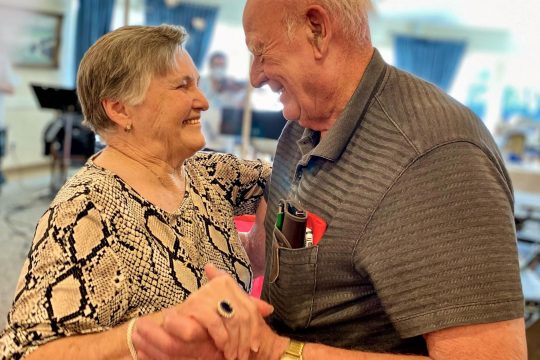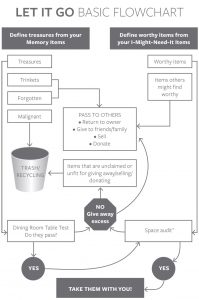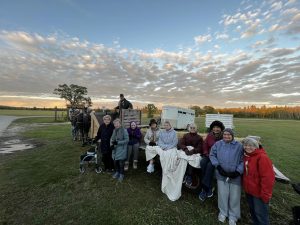
When asked what the key steps to healthy aging are, most adults respond, “Exercise more,” “Drink more water” and “Eat brain-enhancing foods.” Few people recognize one of the more significant steps to empowering a healthy retirement: decluttering.
Whether you are downsizing or beginning the transition to a retirement community, getting rid of the clutter has many benefits, not only from the results but also from the process.
To ease the transition into a retirement lifestyle that fits your needs, use the decluttering tips below.
What Are the Benefits Of Decluttering
Retirement is an exciting time for older adults. Clearing out the clutter —from old tax returns to clothes you don’t wear to keepsakes that are no longer meaningful to you— can be a wonderful gift to yourself and your family.
As you enter this new stage of life, you have a chance to live lighter and less burdened by “stuff”. You also have a chance to take control over your belongings and do what you intend with them.
Another good reason for downsizing your home by decluttering or otherwise simplifying your living environment is that it reduces falls risk. Floors with clutter can cause seniors to trip, lose their balance, and fall.
Further, psychological studies have shown that clutter exacerbates anxiety, depression, and generally makes us feel overwhelmed and stressed. Cleaning, on the other hand, is often cited as a stress-reliever… and it also burns calories! Outer order contributes to inner calm and more time to focus on the people and activities that mean the most to you.
How To Start Decluttering in Preparation for Retirement Living
 Take a quick mental inventory of your possessions. According to Peter Walsh in his book Let It Go, everything you own fits into one of three categories:
Take a quick mental inventory of your possessions. According to Peter Walsh in his book Let It Go, everything you own fits into one of three categories:
- Memory Items
- I-Might-Need-It Items
- Trash/Recycling
The “I-might-need-it items” are those with a useful function. From blenders to clothing, 80% of household items typically fall into this category. Once you categorize your stuff, it is easier to determine whether you’ll keep it or let it go. Only keep the memory items that are truly irreplaceable – the treasures.
Start Early and Pace Yourself
The first decluttering tip for seniors is to give yourself plenty of time, if possible.
For many older adults, their home literally contains a lifetime’s worth of memories. To prevent feeling rushed or trying to downsize when an unexpected change in plans or health event arises, begin decluttering early and gradually.
If you are preparing for a transition to an active living community, start the process approximately 3 months before your move. That way you won’t feel you have to tackle every room at once. Set aside 15 minutes a day to de-clutter an area of your home – a drawer, closet, etc.
Organizing professionals like Peter Walsh and Marie Kondo say, if you’re having a hard time letting something go, ask yourself: Is it useful? Is it beautiful? Have I used it in the last year? Does it “spark joy?” These questions help you pinpoint what you truly value.
Go Room by Room
It’s also important to start somewhere easy. Don’t head straight into the storeroom or garage. Start with a bathroom or closet. First, get rid of items that you don’t need or use and cull them once and for all. Clear the surfaces, organise what’s left and practice keeping just what you need and use, no excess. Be ruthless.

The KonMari Method™ encourages tidying by category – rather than location – beginning with clothes, then moving on to books, papers, sentimental items, and furniture. Keep only those things that speak to the heart or that you use regularly.
Some example categories could include:
- Address the dreaded “junk drawer”
- Organize small kitchen items
- Pick shoes to give away and to keep
- Trim down clothing in your closet
- Tackle your dresser drawers
- Go through books, records, and DVDs
Follow the one-year rule: If you haven’t used an item in the last year, you’re unlikely to use it in the next.
Set Clear Decluttering Ground Rules
Once you start decluttering and combing through items, it is tempting to make exceptions here and there. Before you know it, all you’ve done is taken items from one place and moved them to another, instead of culling your stuff.
The best way to avoid this is to set strong ground rules. Especially if you are downsizing for a move. Divide items into:
- Keep
- Donate or sell
- Trash or recycle
- Pass it down or memorialize (through a photo)
Give Yourself Time to Reminisce
Wading through a lifetime of memories can bring up a lot of emotions.
According to a 2018 letter from the Harvard Medical School: “Understanding the triggers for these feelings and using strategies to navigate them may not change how you feel, but it may help the downsizing process go more smoothly so you can focus on your next chapter.”
To help you cope, be sure to give yourself the time and space to reminisce as you sort through things.
- Look through items you’ve saved and reflect on the memories.
- Take pictures of mementos before letting them go can help hold onto special memories without keeping the physical item itself. Write down stories to share with a loved one.
- If you’re going through photo albums, add details like names and dates to photos. When your family peruses your albums, it will help you both to reminisce. Consider creating a Memory Book.
Decluttering Tips For Your Move to Retirement Living

Above all, maintain a positive outlook. If you are aware of an upcoming change in lifestyle — like a move to a retirement home — this is a time to focus on the many activities in your new active living community and on what items will physically fit into your new home.
If you are moving into an All Seniors Care Living Centre like our newly opened Cataraqui Heights in Kingston, or are exploring a luxury active living community that is in development in Calgary, Alberta, speak to one of our experts or read our handy Guide to Moving.
Contact us today!
Writer – Julianna McLeod
Julianna is a health and wellness expert at All Seniors Care. Her mission is to create content that empowers seniors to form sustainable solutions for lasting health and happiness. She is an experienced writer, editor, and Recreational Therapist living in Toronto.
